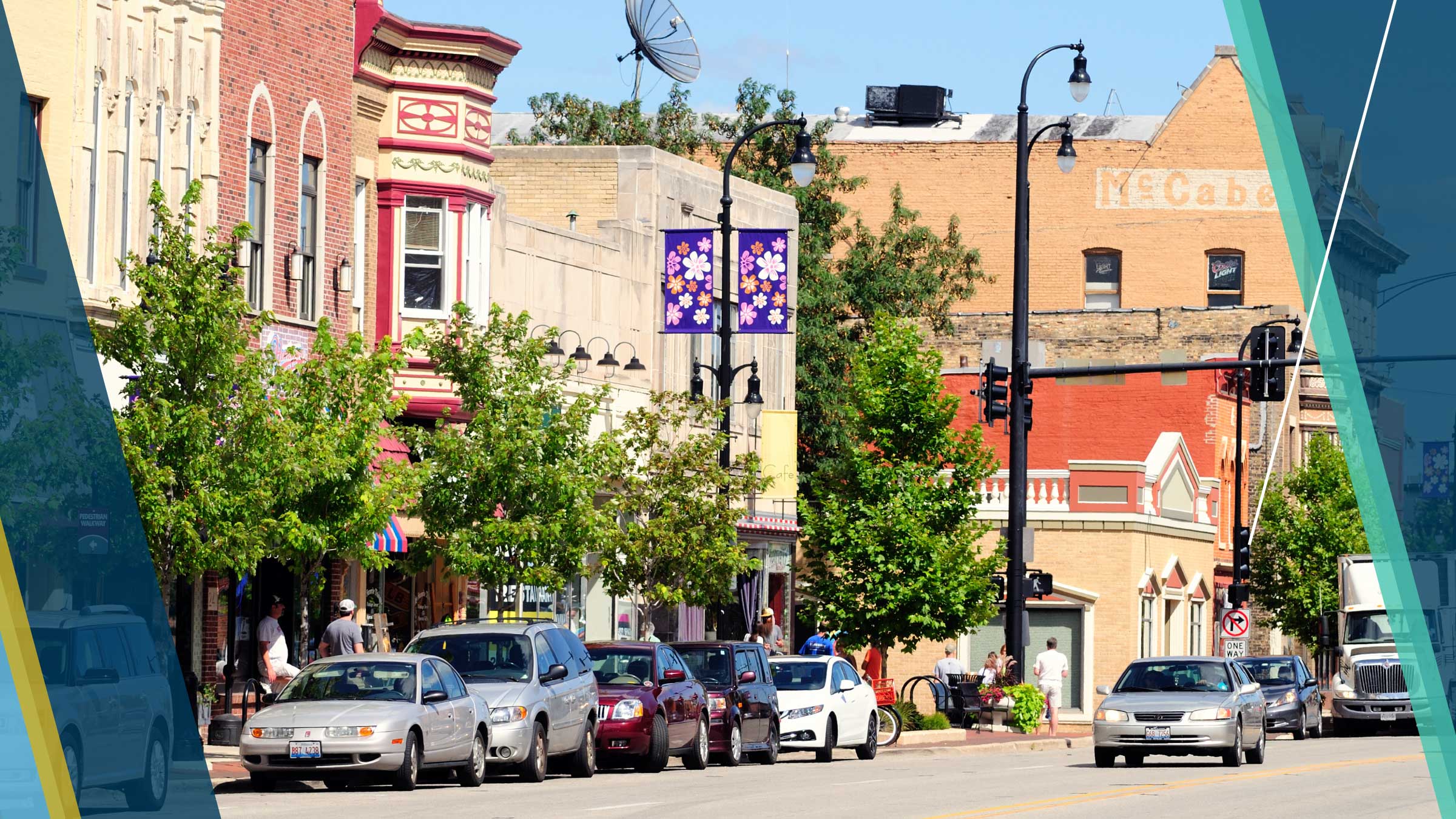When it snows he plows and when it floods he ferries sandbags. In between the blizzards and rainstorms, he spreads gravel, digs holes and levels out roads. For Gene Rosholt, owner of Rosholt's Gravel and Excavating, it's been a steady living in a small town and over the years it's provided a comfortable income for him, his wife and his four children.
But like most, Rosholt holds hope for something a little better, for a bit more money to level out the bumps in his own life. He dares hope for the jackpot that would allow him to consider, on any given day, whether he really even wants to put on his work clothes and fire up the front-end loader. And so, in mid-August last year, Rosholt drove from his home in Buxton, N.D., to Climax, Minn.—as he often has before—and bought a Powerball ticket.
This story doesn't end in immeasurable riches for the North Dakotan and his kin. "I didn't actually win the Powerball," he pointed out. But Rosholt did win $100,000, and a few months later, he decided to share that pleasure with his fellow North Dakotans—albeit indirectly—by voting for a constitutional amendment to allow state residents to purchase lottery tickets within the state's borders.
The November 2002 vote was the fourth attempt in recent years to bring a lottery to North Dakota, one of the nation's few remaining states without one. And the key argument used by lottery advocates this time around was that the game could bring the state millions in tax revenue, rather than sending it to neighboring states.
After all, said lottery advocates, thousands of North Dakotans just like Rosholt drive over state borders to buy their lottery tickets in Minnesota or South Dakota. (Four of Minnesota's top five Powerball and state lottery retailers are in East Grand Forks and Moorhead.) But unlike Rosholt, few of them bring home more than they spend "abroad," and lottery proponents reasoned that the state should capture those revenues. "Given the state's overall financial situation," said Pat Crotty of the pro-lottery group, "we felt a case could be made that money should stay here."
Apparently, their argument was persuasive. The ballot measure passed solidly, with nearly two-thirds voting in favor. And Rosholt himself is convinced that the lottery will benefit the state. "I'm hoping that it'll bring more revenue into North Dakota for education and stuff like that," he said.
The cross-border revenue pressure that convinced North Dakotans to give themselves a lottery has spread lotteries across the country like a rippling wave ever since New Hampshire began its first in 1964. But as lotteries have proliferated, the state governments that oversee them have found themselves heavily promoting products that haven't actually provided the payoff that most legislators—and the public—expected. A close analysis shows that traditional lotteries—scratch-off tickets and lotto games like Powerball—generate surprisingly little tax revenue for Ninth District states.
But these traditional lotteries aren't the only game in town. State governments in the Ninth District also authorize and heavily tax other types of gambling such as pulltabs and video gambling devices available at local stores and neighborhood bars. As it turns out, these are often far bigger moneymakers for state governments than the heavily touted state lotteries.
Disappointing jackpots
Despite all the publicity that surrounds them, all the advertising, controversy and justifications—this money helps to: (pick one) reduce property taxes, fund education, preserve nature, treat problem gamblers—the fact is, traditional lotteries raise very little tax revenue. Data show that's true nationally, but in the Ninth District, it's even more the case.
In Montana, for example, lottery sales brought in tax revenue of about $6.6 million in 2000, just 0.19 percent of the state's general revenue (or 0.29 percent of own-source general revenue), which amounted to about $7.30 per person. Other district state lotteries were slightly more lucrative, but none approached the national average of about 1.2 percent. In Minnesota, lottery proceeds available to the state after prize payouts, administrative costs and vendor commissions amounted to $57.3 million in 2000, just 0.27 percent of the state's $21 billion general fund that year. Wisconsin's lottery, the highest revenue producer in the district relative to its state budget, provided 0.54 percent of the state's general revenue, and provided just $76 in property tax relief to the average household in 2002. "People thought it would generate huge property tax reductions," said Wisconsin state Sen. Robert Cowles. "But it's really a minimal amount."
Moreover, state lotteries are providing less revenue growth as time goes on, barely keeping up with inflation. Though they're monopolies, they face increased competition for consumer gambling dollars, from lotteries in other states and from other types of gambling. Most states have responded by raising payout rates (the percentage of gross sales that are paid back in prizes) to boost ticket purchases, but sales have been stalling nonetheless. In Minnesota, for example, gross sales in fiscal year 2002 were virtually unchanged from those in fiscal year 1996.
Like any business faced with stagnant profits from current product lines, states have sought out revenue from other gambling sources. In Wisconsin, the government is ratcheting up pressure on Indian casinos, but other district states have either developed new state lottery products and promoted them aggressively, or given government approval to privately owned forms of gambling and then taxed them heavily.
Minnesota, for example, relies on pulltabs. In 2000, the state collected over $58 million in pulltab tax revenue, more than the lottery brought in that year despite having its best sales year in history. The picture is more dramatic in South Dakota, where traditional lottery products, scratch-off tickets and various lotto games including Powerball, raised only $6.5 million in government revenue in fiscal year 2002. The real jackpot for the state was video lottery, which raised nearly $103 million in tax revenue, making it South Dakota's second largest revenue source after the general sales tax.
Montana's addiction
Montana licenses over 18,000 video gambling machines around the state—twice as many per capita as South Dakota—and collects permit fees and 15 percent of gross machine revenue. In 2000, that amounted to over $44 million, seven times the total brought in by the state lottery. VGM revenue and the taxes levied on it have climbed every year since the machines were first permitted in 1990. Until recently, these permit and tax revenues were collected by the state but then returned to cities and municipalities in direct proportion to gambling expenditure in their area.
Montana has come to depend on those gambling taxes. "Cities and towns are particularly dependent," noted a 1998 governor's commission on gambling, which said that VGM tax distributions accounted for almost 14 percent of city/town total general fund appropriations, on average, in fiscal year 1997, with some towns pulling nearly 40 percent of their budgets from gambling machines. Helena's Independent Record ran a series of stories on government reliance on VGM revenues under the headline, "Economic Cocaine."
Montana tax law changed in 2001; now after VGM revenue goes into the state general fund, it's disbursed to municipalities according to a negotiated formula rather than in direct proportion to local gambling expenditure. Still, it constitutes a major source of state, county and local funding, even if it's not a dollar-for-dollar pass-through to the city that generated the revenue. And some say that's a problem. Chuck Tooley, the mayor of Billings, Mont., said that prior to the 2001 revenue distribution change, gambling taxes represented about 16 percent of his city's general fund revenues. "We only have 125 uniformed, sworn police officers in the City of Billings police force," he said. "You take away gambling revenue and it equals the salaries of probably about 80 to 100 of them. See the problem?" There's less linkage now, but gambling revenues are still, in the words of another Billings city official, "a life raft."
Still hoping for the lottery payoff
Back in North Dakota, the people have spoken for a different type of gambling: A lottery is on its way. A legislative commission is now studying which multistate lottery to join and debating the minimum gambling age. Lawmakers also are considering how much money to devote to treatment for problem gamblers and whether to dedicate revenue to K-12 education or other purposes.
Rosholt himself is looking forward to his state's new lottery, in part because he'll no longer have to drive to Minnesota for Powerball tickets. "If you can buy them in North Dakota," he said, "I'll buy them in North Dakota." And like lottery supporters everywhere, he's pretty convinced that the lottery will pay off for him even if he never buys another ticket. He's got one granddaughter and another is on the way. "So I guess that's where I look at," he explained. "If it's going to help the education system, why, somewhere down the road, it's hopefully going to help my grandkids."





